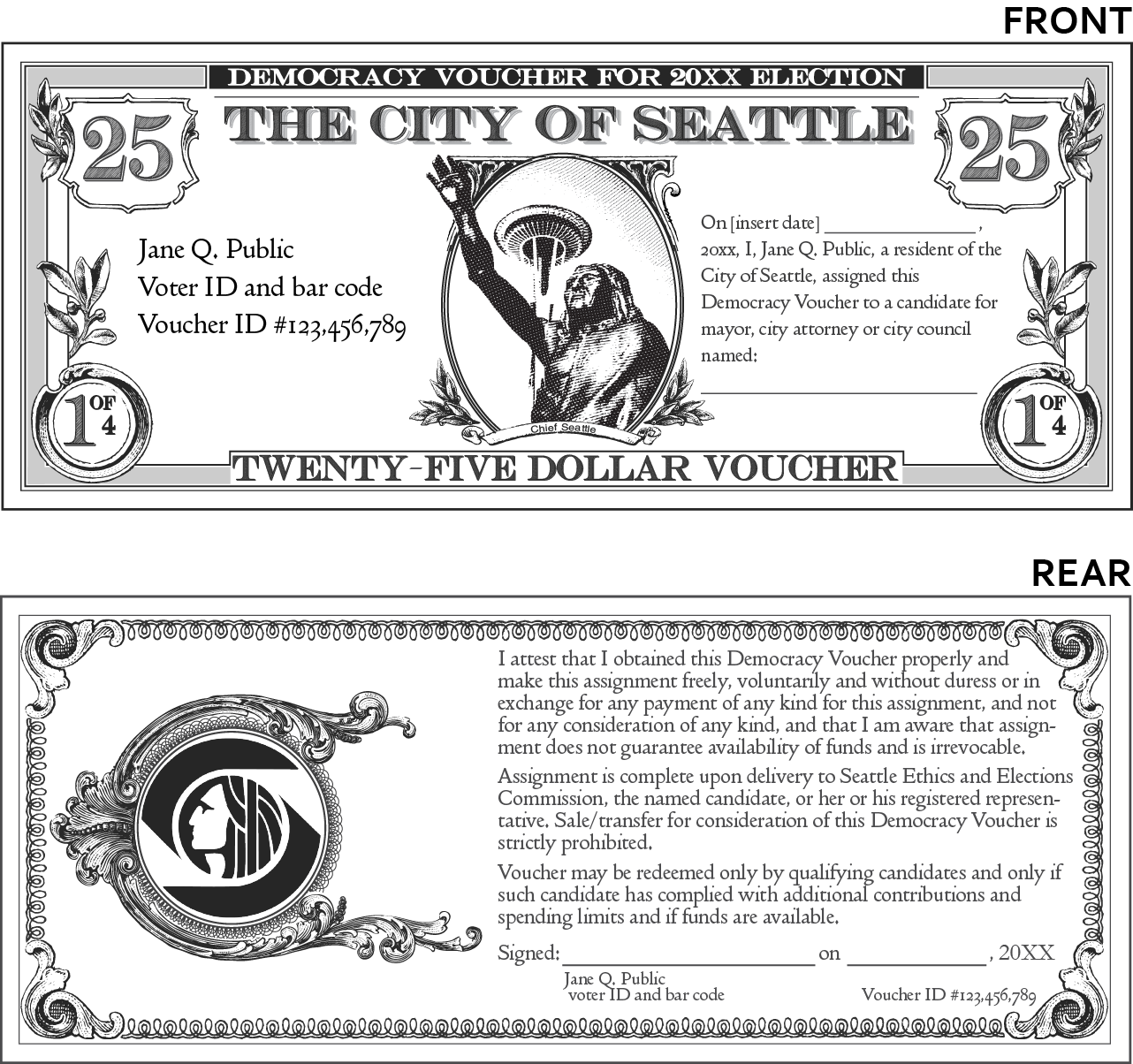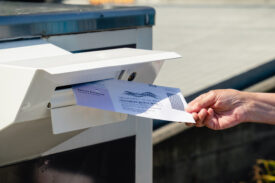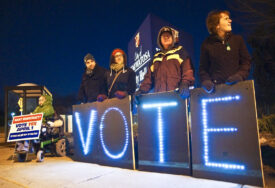Last time, I described the Honest Elections Seattle Initiative’s tough new rules for preventing corruption and giving ordinary voters a louder voice in local elections. This time, I begin to detail how Democracy Vouchers, the most innovative part of the initiative, work by explaining them from a voter’s perspective. Next time, I’ll do the same from a candidate’s perspective.
Democracy Vouchers are simplicity itself for voters. In January of a municipal election year, if you’re registered to vote in Seattle, you’ll get an envelope in the mail from the Seattle Ethics and Elections Commission (SEEC). It may look like the ballot envelopes you’re used to getting from King County Elections. Inside will be an instruction sheet and four $25 Democracy Vouchers with your name on them.
The instructions will explain that the people of Seattle have set aside by initiative a small pool of public money to distribute to candidates who agree to obey Honest Elections Seattle’s tough new rules: tight limits on total campaign spending, no big money, no secret money, no shady coordination with PACs or other so-called independent expenditure campaigns, and penalties for benefiting from such campaigns even if you had nothing to do with them. To distribute this money to candidates, the instructions will explain, the city is leaving everything up to voters. You can give your Democracy Vouchers to any candidate for mayor, city council, or city attorney who has qualified for Honest Elections. You can give all four vouchers to one candidate, one voucher each to four candidates, or any other combination.
To assign a voucher, you write in a candidate’s name and sign it. Then you can mail it to SEEC or to the candidate or hand it to the candidate or a campaign worker. Or, if you prefer, you can register online and use digital vouchers instead.
If you’re among the 1 or 2 percent of Seattle voters who pay very close attention to local politics, you might sit right down and mail your vouchers off to your favorite candidate. If you’re a more typical voter, though, you’ll think, “Oh, cool. I wonder who’s running.” Then you will set the vouchers aside and forget about them until…
A few months later, you might get an invitation to a house party from a friend. “Come over and meet my favorite council candidate, and bring your vouchers!” Or your neighborhood blog might mention a Democracy Voucher Forum at your local library: “Bring your vouchers and pick your candidates in person!” Or a candidate might knock on your door, telling you her positions and asking for your vote and your vouchers. Or you might get an email from a group you belong to—union, small business owners, Sierra Club, Tea Party, OneAmerica Votes, whatever—saying, “We endorse Speed Racer for Mayor. Let’s all send Speed our vouchers this week!” Or your coworkers or church group or yoga buddies might be talking politics and you’ll learn something that convinces you to send a voucher to Racer X instead. Or you might hear a radio interview with Spritle that gets you fired up to send your coupons his way.
If you’ve misplaced your Democracy Vouchers, or find yourself talking to a candidate at the farmer’s market and want to assign vouchers on the spot, no worries: the online system will let you deliver vouchers electronically. In fact, the candidate at the farmer’s market might be accompanied by a volunteer who can help you click through the city Democracy Voucher site and assign your vouchers then and there on your phone or on the campaign’s tablet.
If someone steals your vouchers and tries to forge your signature, you can get a replacement. (You can always check if yours has been used by looking it up on the SEEC website.) If someone offers to buy your vouchers, you can report them. Trying to buy or sell vouchers is a serious crime, like buying votes. The penalties include prison time. A candidate whose campaign participates in such fraud can be ejected from the program and required to repay public funds. If you suspect someone else is cheating, you can call the police or SEEC, send a tip to a political reporter or a campaign you suspect is being put at a disadvantage. You can even investigate yourself by looking up their vouchers online. The whole Democracy Voucher system is public and transparent: it’s like a card game where everyone’s cards are face up—not terribly suspenseful but almost impossible to cheat in.
That’s about all you need to know as a voter to use Democracy Vouchers, aside from the fact that they will radically democratize elections in Seattle by giving everyone a more equal voice in funding campaigns. Whether you’re a barista or a CEO, a janitor or a managing partner, you get exactly the same $100 of vouchers. And to candidates, as I’ll describe next time, that fact will make all the difference.








